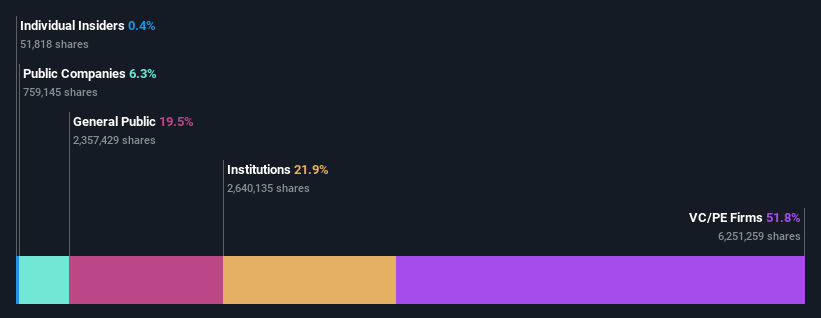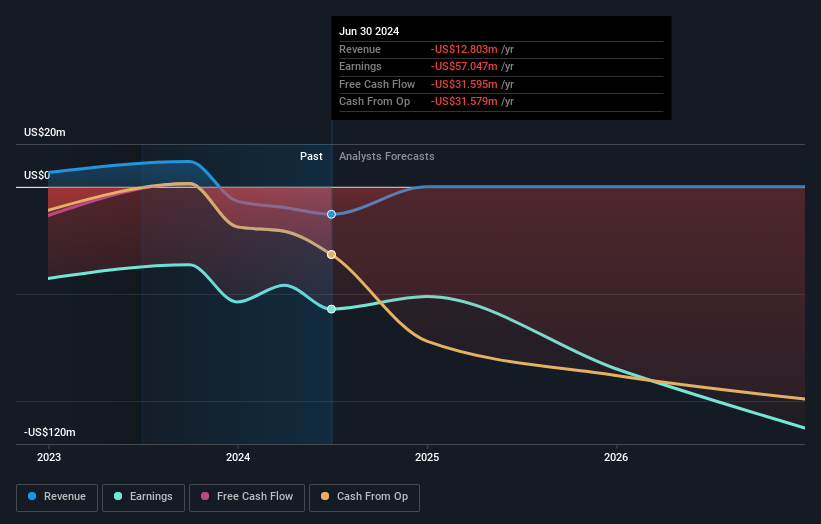- United States
- /
- Biotech
- /
- NasdaqCM:QTTB
private equity firms who own 52% along with institutions invested in Q32 Bio Inc. (NASDAQ:QTTB) saw increase in their holdings value last week

Key Insights
- Q32 Bio's significant private equity firms ownership suggests that the key decisions are influenced by shareholders from the larger public
- 52% of the business is held by the top 4 shareholders
- 22% of Q32 Bio is held by Institutions
If you want to know who really controls Q32 Bio Inc. (NASDAQ:QTTB), then you'll have to look at the makeup of its share registry. And the group that holds the biggest piece of the pie are private equity firms with 52% ownership. Put another way, the group faces the maximum upside potential (or downside risk).
While private equity firms were the group that reaped the most benefits after last week’s 12% price gain, institutions also received a 22% cut.
Let's take a closer look to see what the different types of shareholders can tell us about Q32 Bio.
View our latest analysis for Q32 Bio

What Does The Institutional Ownership Tell Us About Q32 Bio?
Many institutions measure their performance against an index that approximates the local market. So they usually pay more attention to companies that are included in major indices.
We can see that Q32 Bio does have institutional investors; and they hold a good portion of the company's stock. This implies the analysts working for those institutions have looked at the stock and they like it. But just like anyone else, they could be wrong. If multiple institutions change their view on a stock at the same time, you could see the share price drop fast. It's therefore worth looking at Q32 Bio's earnings history below. Of course, the future is what really matters.

Hedge funds don't have many shares in Q32 Bio. Our data shows that OrbiMed Advisors LLC is the largest shareholder with 19% of shares outstanding. Atlas Venture L.P. is the second largest shareholder owning 17% of common stock, and Abingworth LLP holds about 9.1% of the company stock.
To make our study more interesting, we found that the top 4 shareholders control more than half of the company which implies that this group has considerable sway over the company's decision-making.
While studying institutional ownership for a company can add value to your research, it is also a good practice to research analyst recommendations to get a deeper understand of a stock's expected performance. There are plenty of analysts covering the stock, so it might be worth seeing what they are forecasting, too.
Insider Ownership Of Q32 Bio
While the precise definition of an insider can be subjective, almost everyone considers board members to be insiders. Management ultimately answers to the board. However, it is not uncommon for managers to be executive board members, especially if they are a founder or the CEO.
Insider ownership is positive when it signals leadership are thinking like the true owners of the company. However, high insider ownership can also give immense power to a small group within the company. This can be negative in some circumstances.
Our data suggests that insiders own under 1% of Q32 Bio Inc. in their own names. It seems the board members have no more than US$2.3m worth of shares in the US$540m company. We generally like to see a board more invested. However it might be worth checking if those insiders have been buying.
General Public Ownership
The general public-- including retail investors -- own 20% stake in the company, and hence can't easily be ignored. While this group can't necessarily call the shots, it can certainly have a real influence on how the company is run.
Private Equity Ownership
With an ownership of 52%, private equity firms are in a position to play a role in shaping corporate strategy with a focus on value creation. Some might like this, because private equity are sometimes activists who hold management accountable. But other times, private equity is selling out, having taking the company public.
Public Company Ownership
It appears to us that public companies own 6.3% of Q32 Bio. We can't be certain but it is quite possible this is a strategic stake. The businesses may be similar, or work together.
Next Steps:
While it is well worth considering the different groups that own a company, there are other factors that are even more important. For instance, we've identified 4 warning signs for Q32 Bio (2 are concerning) that you should be aware of.
If you would prefer discover what analysts are predicting in terms of future growth, do not miss this free report on analyst forecasts.
NB: Figures in this article are calculated using data from the last twelve months, which refer to the 12-month period ending on the last date of the month the financial statement is dated. This may not be consistent with full year annual report figures.
Valuation is complex, but we're here to simplify it.
Discover if Q32 Bio might be undervalued or overvalued with our detailed analysis, featuring fair value estimates, potential risks, dividends, insider trades, and its financial condition.
Access Free AnalysisHave feedback on this article? Concerned about the content? Get in touch with us directly. Alternatively, email editorial-team (at) simplywallst.com.
This article by Simply Wall St is general in nature. We provide commentary based on historical data and analyst forecasts only using an unbiased methodology and our articles are not intended to be financial advice. It does not constitute a recommendation to buy or sell any stock, and does not take account of your objectives, or your financial situation. We aim to bring you long-term focused analysis driven by fundamental data. Note that our analysis may not factor in the latest price-sensitive company announcements or qualitative material. Simply Wall St has no position in any stocks mentioned.
About NasdaqCM:QTTB
Q32 Bio
A clinical-stage biotechnology company, develops novel biologics to restore healthy immune balance in patients with autoimmune and inflammatory diseases driven by pathological immune dysfunction.
Medium-low with weak fundamentals.
Market Insights
Community Narratives



